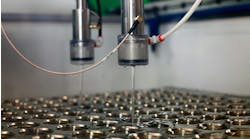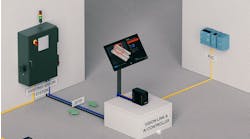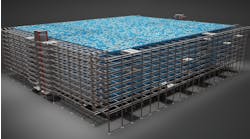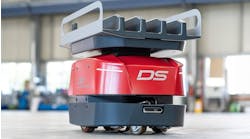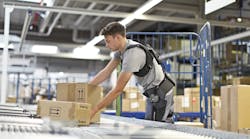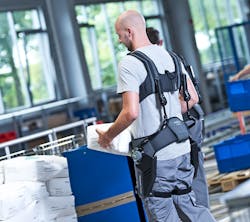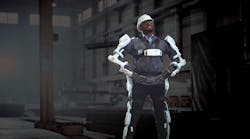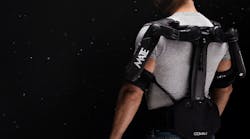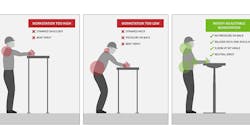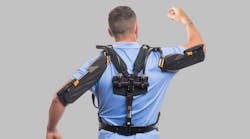Latest from Industry Trends
Workers in logistics facilities, such as parcel distribution centers, lift the equivalent weight of a Boeing 747 airplane over five workdays, on average, from carrying packages, crates, and other objects on the job, according to a new study for North America. The study affirmed that a high percentage of workers in the logistics industry suffer from musculoskeletal disorder (MSD)— an issue that forward-thinking companies such as Amazon have publicly identified in media reports as a high priority for the industry.
To address the issue of workplace injuries and enable companies to improve occupational health and safety, Ottobock today announced the company’s expansion in the U.S. with a logistics-focused customer success team based in Austin, Texas and the availability of a wearable exoskeletal device called Paexo Back. Worn by workers like a backpack, Paexo Back is designed with precision to help prevent back injuries and alleviate back pain.
“The introduction of the Ottobock Paexo Back is one of the most important people-centric innovations to be delivered to the logistics industry in decades,” said Dr. Sönke Rössing, Head of Industrials at Ottobock. “It provides the ability to reduce the risk of workers’ back injuries and transform how logistics companies support and protect their workforce with an industrial-grade solution. By making Paexo Back generally available in North America, we are enabling companies to take practical and effective action to drive down the increasing problem of musculoskeletal disorders.”
Check out more of Ottobock's ergonomic solutions here.
Musculoskeletal disorders affect 1.7 billion people worldwide, according to the World Health Organization. MSDs are one of the leading workplace injuries in the United States, often associated with jobs in warehouses, distribution centers, and factories. Approximately 33% of all work-related injuries involve MSDs. The economic impact is estimated at $50 billion per year.
Serving as an example, Amazon founder Jeff Bezos has identified musculoskeletal disorders as accounting for approximately 40% of work-related injuries across his company, according to a CNBC media report. His transparency in a letter to shareholders recently has turned MSDs into a higher-profile issue, calling for new tools to prevent musculoskeletal disorders.
One solution to MSDs is the Ottobock Paexo Back, a wearable exoskeleton that relieves pressure on a person’s back while the person is lifting an object. Giving workers full freedom of motion, Paexo Back features an innovative control at the hip that automatically distinguishes between bending and walking and switches itself off during walking. The load is supported on the shoulders and transferred to the legs with the help of the exoskeleton’s support structure. Weighing just over 8 lb., it can be put on and off in seconds, worn comfortably all day, and does not need an energy supply.
“Paexo Back has exceeded our expectations for enabling our company to take more of a preventative approach to work-related injuries,” said Jeff Collins, CEO of Cascade Orthopedic Supply. “Employees love wearing the lightweight exoskeletons because they know the product protects them. We are already starting to see the beneficial trend of a lower number of missed workdays and higher employee satisfaction while reducing risk. Paexo Back is perfect for a logistics work environment.”
A scientific study was conducted to analyze the effectiveness of wearing an exoskeleton while lifting boxes and other objects in a logistics facility. An environment simulating a real logistics facility was used. The cumulative effect of carrying heavy items during full-time shifts over a 5-day work week in a typical parcel distribution center is equivalent to the effect of carrying a Boeing 747 airplane on one’s back. With Paexo Back, however, this load on the spine can be eliminated by up to 100%.
“As a logistics business, our use of the wearable exoskeleton Paexo Back will help prevent work-related injuries and give our workers the support they need to stay healthy,” said a logistics manager at a large furniture retailer. “New tools for injury prevention have been needed in the logistics industry for a long time."
Paexo Back is part of a larger Paexo family of exoskeletons that are designed for different parts of the human body, including the neck, thumb, wrist, shoulder, and back. The Ottobock Paexo exoskeleton series aims to offer ergonomic solutions that help people protect their health as they perform physically demanding tasks on a daily basis. Customers can immediately test this new technology with Ottobock’s Experience Packages starting from $6,900 (USD).
“Expanding our operations in the U.S. is an exciting opportunity to help logistics companies improve injury prevention. Our innovation with Paexo Back will empower logistics companies to create safer and more ergonomic work environments for manual load handling,” said Samuel Reimer, Director of Sales and Marketing, Ottobock Industrials North America, based in Austin. “I’m thrilled to be leading the team based in Austin, Texas that will provide ergonomic improvements to companies in North America. The business case for wearable exoskeletons is strong, but, ultimately, improving the quality of life for workers is the strongest reason for a logistics company to take action now.”
Learn More: “The Future of Injury Prevention in Logistics Facilities—One Worker, One Wearable Exoskeleton at a Time” featuring highlights of the study that was conducted to analyze the impact of an exoskeleton.
Ottobock develops “wearable human bionics”—medical technology products for people with limited mobility in the fields of Prosthetics, Orthotics, and Human Mobility (wheelchairs). With the Paexo exoskeletons, Ottobock has transferred its expertise in biomechanics to applications for industry as well since 2012.

